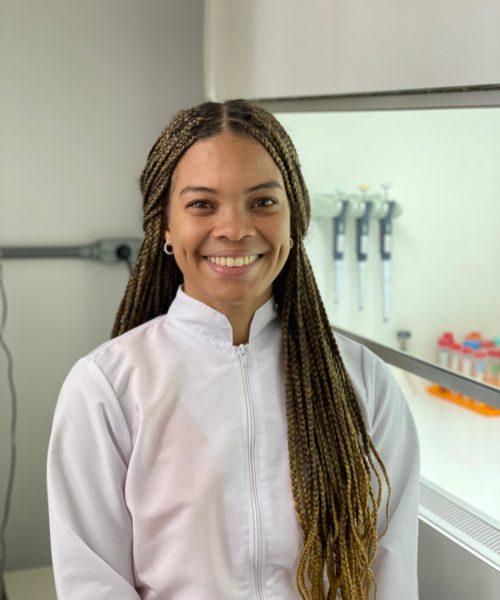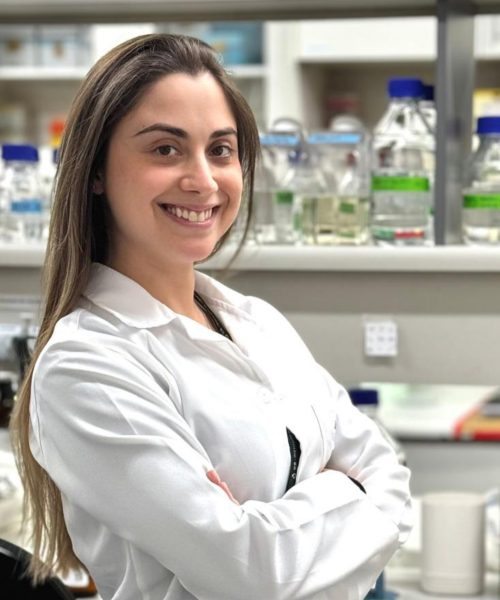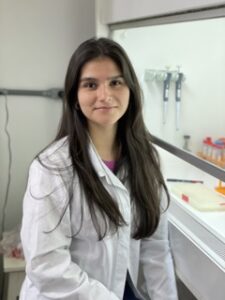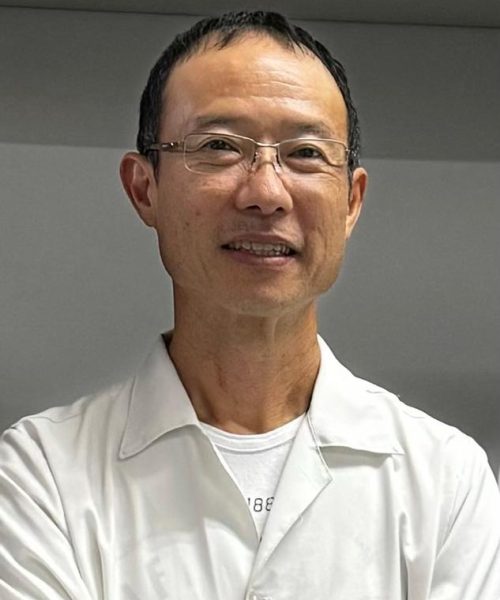
SILVIA BEATRIZ BOSCARDIN
Phone: +55 (11) 3091-7263
Room: 46
Email: sbboscardin@usp.br
Currículo Lattes
Personal site: http://www.researcherid.com/rid/C-3397-2012
GROUP MEMBERS

Bianca da Silva Almeida
- Collaborating Researcher
- biancaalmeida@usp.br
- +55 (11) 3091-7263
Demétrio Speckhort
- Trainee
- demetrio.speckhort@usp.br
- +55 (11) 3091-7263
Fernando Bandeira Sulczewski
- Collaborating Researcher
- fernandobs.biomed@gmail.com
- +55 (11) 3091-7263

Guilherme Antonio de Souza Silva
- PhD Student
- guilherme.souzasilva@icb.usp.br
- +55 (11) 3091-7263

Isabela Pazotti Daher
- PhD Student
- isa.daher@usp.br
- +55 (11) 3091-7263

Isabela Resende Azevedo
- PhD Student
- isaresendeazevedo@usp.br
- +55 (11) 3091-7263
José Eduardo Ulloa Rojas
- Postdoc
- joeullo901@gmail.com
- +55 (11) 3091-7263

Kenya Elizana de Souza Abreu
- Trainee
- kenyasouza@usp.br
- +55 (11) 3091-7263

Marcio Massao Yamamoto
- Laboratory Technician
- masayama@usp.br
- +55 (11) 3091-7263
Mariângela de Oliveira Silva
- Postdoc
- mariangelasilva@usp.br
- +55 (11) 3091-7263

Nathalia Alarcon Otálora
- MSc Student
- nathalia.alarcon@icb.usp.br
- +55 (11) 3091-7263

Nayara da Silva Antonio
- PhD Student
- nayara.silva@icb.usp.br
- +55 (11) 3091-7263
RESEARCH LINE
Development of vaccines and treatments against infectious diseases through the use of recombinant monoclonal antibodies.
PUBLICATIONS
- SILVA, M.O.; CASTRO-AMARANTE, M.F.; VENCESLAU-CARVALHO, A.A.; ALMEIDA, B.S.; DAHER, I.P.; SOUZA-SILVA, G.A.; YAMAMOTO, M.M.; KOIKE, G.; DE SOUZA, E.E.; WRENGER, C.; FERREIRA, L.C.S.; BOSCARDIN, S.B. Enhanced Immunogenicity and Protective Effects against SARS-CoV-2 Following Immunization with a Recombinant RBD-IgG Chimeric Protein. Vaccines, v. 12, p. 356-370, 2024.
- ADAMI, F.L.; DE CASTRO, M.V.; ALMEIDA, B.S.; DAHER, I.P.; YAMAMOTO, M.M.; SOUZA SANTOS, K.; ZATZ, M.; NASLAVSKY, M.S.; ROSA, D.S.; CUNHA-NETO, E.; DE OLIVEIRA, V.L.; KALIL, J; BOSCARDIN, S.B. Anti-RBD IgG antibodies from endemic coronaviruses do not protect against the acquisition of SARS-CoV-2 infection among exposed uninfected individuals. Frontiers in Immunology, v. 15, p. 1396603, 2024.
- FERREIRA, N.S.; LIMA, N.F.; SULCZEWSKI, F.B.; SOARES, I.S.; FERREIRA, M.U.; BOSCARDIN, S.B. Plasmodium vivax infection changes the peripheral immunoregulatory network: CD4 T follicular cells and B cells. European Journal of Immunology (Internet), v.53, p.2350372, 2023.
- DE SOUZA-SILVA, G.A.; SULCZEWSKI, F.B.; BOSCARDIN, S.B. Recombinant antigen delivery to dendritic cells as a way to improve vaccine design. Experimental Biology and Medicine, v. 248 (9), p. 1-8, 2023.
- SANTOS SOUZA, H.F.; ZANETI, A.B.; DA SILVA ALMEIDA, B.; MARTINHO, J. A.; YAMAMOTO, M.M.; ROSA, D.S.; SLHESSARENKO, R.D.; BOSCARDIN, S.B. Reactivity of DENV-positive sera against recombinant envelope proteins produced in bacteria and eukaryotic cells. Immunologic Research, v. 71, p. 39-50, 2022.
- SULCZEWSKI, F.B.; MARTINO, L.A.; SALLES, D.; YAMAMOTO, M.M.; ROSA, D.S.; BOSCARDIN, S.B. STAT3 Signaling Modulates the Immune Response Induced After Antigen Targeting to Conventional Type 1 Dendritic Cells through the DEC205 receptor. Frontiers in Immunology, v. 13, p. 1006996, 2022.
- SULCZEWSKI, F.B.; MARTINO, L.A.; DA SILVA ALMEIDA, B.; YAMAMOTO, M.M.; ROSA, D.S.; BOSCARDIN, S.B. STAT6 signaling pathway controls germinal center responses promoted after antigen targeting to conventional type 2 dendritic cells. Current Research in Immunology, v.2, p.120-131, 2021.
- SILVA, M.O.; ALMEIDA, B.S.; SALES, N.S.; DINIZ, M.O.; APS, L.R.; RODRIGUES, K.B.; SILVA, J.R.; MORENO, A.C.R.; PORCHIA, B.F.M.M.; SULCZEWSKI, F.B.; BOSCARDIN, S.B.; FERREIRA, L.C.S. Antigen Delivery To DEC205+ Dendritic Cells Induces Immunological Memory And Protective Antitumor Effects Against HPV-Associated Tumors At Different Anatomical Sites. International Journal of Biological Sciences, v.17, p.2944 – 2956, 2021.
- Boscardin, S.B.; Dudziak, D.; Münz, C.; Rosa, D.S. Editorial: Harnessing the Participation of Dendritic Cells in Immunity and Tolerance. Frontiers in Immunology, v. 11, 59584, 2020.
- SULCZEWSKI, F.B.; MARTINO, L.A.; ALMEIDA, B.S.; ZANETI, A.B.; FERREIRA, N.S.; AMORIM, K.N.S.; YAMAMOTO, M.M.; APOSTOLICO, J.S.; ROSA, D.S.; Boscardin, S.B. Conventional type 1 dendritic cells induce TH1, TH1-like follicular helper T cells and regulatory T cells after antigen boost via DEC205 receptor. European Journal of Immunology (Internet), v.50, p.1895-1911, 2020.
- ALIPRANDINI, E.; TAKATA, D.Y.; LEPIQUE, A.; KALIL, J.; BOSCARDIN, S.B.; MORO, A.M. An oligoclonal combination of human monoclonal antibodies able to neutralize tetanus toxin in vivo. Toxicon: X., v.2, p.100006, 2019.
- ZANETI, A.B.; YAMAMOTO, M.M.; SULCZEWSKI, F.B.; ALMEIDA, B.S.; SOUZA, H.F.S; FERREIRA, N.S.; MAEDA, D.L.N.F.; SALES, N.S.; ROSA, D.S.; FERREIRA, L.C.S; BOSCARDIN, S.B. Dendritic Cell Targeting Using a DNA Vaccine Induces Specific Antibodies and CD4+ T Cells to the Dengue Virus Envelope Protein Domain III. Frontiers in Immunology, v.10, p.59, 2019.
- ALIPRANDINI, E.; TAVARES, J.; PANATIERI, R.H.; THIBERGE, S.; YAMAMOTO, M. M.; SILVIE, O.; ISHINO, T.; YUDA, M.; DARTEVELLE, S.; TRAINCARD, F.; BOSCARDIN, S.B.*; AMINO, R*. Cytotoxic anti-circumsporozoite antibodies target malaria sporozoites in the host skin. Nature Microbiology, v.3, p.224-1233, 2018. * autoria compartilhada
- Antonialli, R; Sulczewski, F. B.; Amorim, K. N. S.; Almeida, B. S.; Ferreira, N. S.; Yamamoto, M. M.; Soares, I. S.; Ferreira, L. C. S.; Rosa, D. S.; Boscardin, S.B. CpG Oligodeoxinucleotides and Flagellin Modulate the Immune Response to Antigens Targeted to CD8α+ and CD8α– Conventional Dendritic Cell Subsets. Frontiers in Immunology, v.8: 1727, 2017.
- APOSTÓLICO, J.S.; LUNARDELLI, V.A.S.; YAMAMOTO, M.M.; SANTOS SOUZA, H.F.; CUNHA-NETO, E.; Boscardin, S.B.; ROSA, D. S. Dendritic Cell Targeting Effectively Boosts T Cell Responses Elicited by an HIV Multiepitope DNA Vaccine. Frontiers in Immunology (Online), v.8: 101, 2017.
- AMORIM, K.N.S.; RAMPAZO, E. V.; ANTONIALLI, R.; YAMAMOTO, M. M.; RODRIGUES, M.M.; SOARES, I.S.; Boscardin, S.B. The presence of T cell epitopes is important for induction of antibody responses against antigens directed to DEC205+ dendritic cells. Scientific Reports, v.6, p.39250, 2016.
- AMORIM, K.N.S., CHAGAS, D. C. G., SULCZEWSKI, F. B., Boscardin, S.B. Dendritic Cells and Their Multiple Roles during Malaria Infection. Journal of Immunology Research, v.2016, p.1-11, 2016.
- RAMPAZO, E. V., AMORIM, K. N. S., YAMAMOTO, M. M., Panatieri, R.H., RODRIGUES, M.M., BOSCARDIN, S. B. Antigen Targeting to Dendritic Cells Allows the Identification of a CD4 T-Cell Epitope within an Immunodominant Trypanosoma cruzi Plos One, v.10, p.e0117778, 2015.
- Henriques, H.R., RAMPAZO, E. V., GONCALVES, A. J. S., VICENTIN, E. C. M., AMORIM, J. H., Panatieri, R.H., AMORIM, K.N.S., YAMAMOTO, M. M., FERREIRA, L. C. S., ALVES, A. M. B., Boscardin, S.B. Targeting the Non-structural Protein 1 from Dengue Virus to a Dendritic Cell Population Confers Protective Immunity to Lethal Virus Challenge. PLoS Neglected Tropical Diseases (Online), v.7, p.e2330, 2013.
- Tewari, K., Flynn, B.J., Boscardin, S.B., Kastenmueller, K., Salazar, A.M., Anderson, C.A., Soundarapandian, V., Ahumada, A., Keler, T., Hoffman, S.L., Nussenzweig M.C., Steinman R.M., Seder R.A. Poly(I:C) is an effective adjuvant for antibody and multi-functional CD4+ T cell responses to Plasmodium falciparum circumsporozoite protein (CSP) and aDEC-CSP in non human primates. Vaccine (Guildford), v.28, p.7256-7266, 2010
- BOSCARDIN, S.B., HAFALLA, J.C.R, MASILAMANI, R.M., KAMPHORST, A.O., ZEBROSKI, H.A., RAI, U., MORROT, A., ZAVALA, F., STEINMAN, R.M., NUSSENZWEIG, R.S., NUSSENZWEIG, M. Antigen targeting to dendritic cells elicits long-lived T cell help for antibody responses. Journal of Experimental Medicine, v.203, p.599-606, 2006
- Kumar, K.A., Sano, G-I., BOSCARDIN, S.B., NUSSENZWEIG, R.S., NUSSENZWEIG, M., ZAVALA, F., Nussenzweig, V. The circumsporozoite protein is an immunodominant protective antigen in irradiated sporozoites. Nature (London), v.444, p.937-940, 2006.
Book Chapters
- Boscardin, S.B. Recent advances in vaccine development against malaria caused by Plasmodium falciparum In: Plasmodium falciparum: Morphology, Life Cycle and Health Impact.1 ed. Hauppauge, NY: Nova Publishers, 2012, v.1, p. 1-56.
- Boscardin, S.B.; NUSSENZWEIG, M.C.; TRUMPFHELLER, C.; STEINMAN, RM. Vaccines based on dendritic cell biology. In: New Generation Vaccines.4 ed. Boca Raton: CRC Press, 2009, v.1, p. 327-339.
- ROSA, D.S.; Boscardin, S.B.; NUNES, J.P.S.; APOSTOLICO, J.S. Resposta imunológica na infecção pelo SARS-COV-2 e na vacinação. In: Schlemper Junior, B.R. (Org.). COVID-19. A guerra da desinformação: O desafio da Ciência, Bioética e Socialização do saber. Curitiba, PR: Appris, 2022, v. 1, p. 75-109.
- ROSA, D.S.; BOSCARDIN, S.B.; PIRES, G.N.; ANDERSEN, M.L.; TUFIK, S. Sleep Disturbances and COVID-19 Vaccines. In: A. S. BaHammam et al. (eds.). COVID-19 and Sleep: A Global Outlook. 1ed. Springer Nature Singapore, 2023, Progress in Sleep Research Books Series p. 153-163.
Patent Submitted
- ALMEIDA, B.S.; BOSCARDIN, S.B. Anticorpo monoclonal, vetor de expressão, uso, composição farmacêutica, processo de produção, método para prevenção e/ou tratamento de infecções por flavivírus, e kit para detecção dos vírus Zika e dengue. 2023, Brasil. Patente: Privilégio de Inovação, Instituição de Registro: INPI – Instituto Nacional da Propriedade Industrial. Data de submissão: 23/11/2023.
Research Projects/Funding
Em andamento
- Instituto Nacional de Ciência e Tecnologia em Investigação em Imunologia (INCTiii). Processo FAPESP 2014/50890-5 e processo CNPq 465434/2014-2. Recursos aprovados: R$ 7.028.750,00. Vigência: 01/07/2017 a 31/12/2024. Coordenador: Jorge Elias Kalil Filho. (Faculdade de Medicina – SP/Incor). Pesquisadora Principal: Silvia Beatriz Boscardin.
- Avaliação do potencial terapêutico de um anticorpo monoclonal contra a infecção causada pelo vírus da dengue – Programas de Inovação Tecnológica/PIPE- Auxílio PIPE- FAPESP 2022/15039-9. Recursos: R$ 135.870,00 e US$ 11.500,00 Vigência: 01/08/2024 a 31/07/2025. Coordenadora: Bianca da Silva Almeida. Pesquisadora Principal: Silvia Beatriz Boscardin.
- Tecnologias de biossensores e sistemas de liberação controlada baseadas em microagulhas para diagnóstico e tratamento de doenças. Acordos de Cooperação / NWO – Netherlands Organization for Scientific Research / NWO – Projeto de Pesquisa – Temático FAPESP 2022/14753-0. Recursos: R$ 890.828,00 e US$ 107.304,18 Vigência: 01/12/2023 a 30/11/2028. Coordenador: Wendel Andrade Alves. Pesquisadora Principal: Silvia Beatriz Boscardin.
- Produção de anticorpos monoclonais humanos anti-SARS-CoV-2 a partir de linfócitos B de memória de pacientes recuperados da COVID-19 – Bolsa de Produtividade em Pesquisa – Nível 1D – Processo CNPQ: 309389/2020-8. Recursos: R$ 57.600,00. Vigência: 01/03/2024 à 28/02/2028. Coordenadora: Silvia Beatriz Boscardin.
- Avaliação pré-clínica da segurança, imunogenicidade e eficácia da vacina MultiCoVax – Chamada CNPq/Decit/SCTIE/MS Nº 49/2022 – Vacinas de RNAm ou DNA. Processo CNPQ: 408518/2022-7. Recursos: R$ 1.680.360,44. Vigência: 09/12/2022 à 31/12/2025. Coordenador: Jorge Elias Kalil Filho. Pesquisadora Principal: Silvia Beatriz Boscardin.
- Generation of protective human monoclonal antibodies to neutralize Plasmodium vivax sporozoite infection. Fiocruz-Pasteur- USP Call for Project Proposals 2023. Recursos: EUR 15.000,00. Vigência: 01/01/2024 à 01/12/2025. Coordenadora: Silvia Beatriz Boscardin.
Auxílios Financeiros Concluídos
- Auxílio Financeiro da The PEW Charitable Trust como parte da bolsa de estudos recebida para a realização de meu pós-doutorado nos Estados Unidos. Recursos: US$ 35.000,00. Vigência: 01/07/2003 a 01/06/2007. Coordenadora: Silvia Beatriz Boscardin
- Direcionamento de antígenos para células dendríticas in vivo: uma nova estratégia para o desenvolvimento de vacinas. – Auxílio Jovem Pesquisador – FAPESP 2007/08648-9. Recursos: R$ 199.410,00 e US$ 175.674,00. Vigência: 01/09/2008 a 31/10/2012. Coordenadora: Silvia Beatriz Boscardin
- Manipulação de células dendríticas para o estudo de interações parasita-hospedeiro nos estágios pré-eritrocíticos da malária – Doação – Banco BNP Paribás. Recursos: R$ 120.000,00. Vigência: 01/04/09 a 31/03/13. Coordenadora: Silvia Beatriz Boscardin
- Direcionando a proteína MSP-142 de Plasmodium vivax in vivo para a subpopulação de células dendríticas DEC205+CD8+: análise das respostas imunes humoral e celular. – Chamada Universal 14/2011 – Faixa A – até R$20.000,00 – Processo CNPQ: 472509/2011-0. Recursos: R$ 17.800,00. Vigência: 20/12/2011 a 19/12/2013. Coordenadora: Silvia Beatriz Boscardin
- Utilizando o conhecimento gerado pelo estudo dos mecanismos imunopatológicos na malária gestacional para desenvolvimento de vacinas que direcionam antígenos para células dendríticas. CAPES-PNPD – AUX-PE-PNPD 2751/2010. Recursos: R$ 516.000,00 (R$ 396.000,00, duas bolsas de Pós-Doutorado e R$ 120.000,00, reserva técnica). Vigência: 01/2011 a 01/2016. Coordenador: Claudio Farias Romero Marinho. Pesquisadora Principal: Silvia Beatriz Boscardin.
- Direcionamento das proteínas E e NS1 do vírus da dengue para células dendríticas: estudo dos mecanismos protetores – Bolsa de Produtividade em Pesquisa – Nível 2 – Processo CNPQ: 309230/2014-4. Recursos: R$ 39.600,00. Vigência: 01/03/2015 à 28/02/2018. Coordenadora: Silvia Beatriz Boscardin
- Imaging and improvement of immune protection against malaria parasites (FAPESP-ANR IM3ALARIA) – Chamada FAPESP/ANR 2014 – Auxílio Regular- FAPESP 2014/50631-0. Recursos: R$ 387.018,31. Vigência: 01/04/2016 a 31/03/2019. Coordenadora: Silvia Beatriz Boscardin
- Desvendando a resposta humoral induzida pela infecção com o vírus Zika utilizando proteínas recombinantes do envelope viral de flavivírus. – Chamada MCTIC/FNDCT-CNPq/MEC-CAPES/MS-Decit/Nº 14/2016 – Prevenção e Combate ao vírus Zika – Processo CNPQ: 440721/2016-4 e Processo CAPES: 2047/2016. Recursos: R$ 200.000,00 (incluindo bolsas). Vigência: 01/11/2016 à 30/11/2020. Coordenadora: Silvia Beatriz Boscardin
- Desenvolvimento de plataformas para a elucidação de mecanismos imunológicos, intervenções e terapias na infecção pelo Zika vírus. – Chamada Pública MCTI/FINEP/FNDCT 01/2016 – ZIKA – Convênio n° 01.16.0077.00 (0269/16) sob responsabilidade da Sociedade Beneficente Israelita Brasileira Hospital Albert Einstein. Sub-Projeto: MABSZIKA. Recursos: R$ 1.949.775,00. Vigência: 27/12/2016 à 27/12/2020. Coordenador Geral: Luiz Vicente Rizzo. Coordenadora do Sub-Projeto MABSZIKA: Silvia Beatriz Boscardin.
- Desvendando a resposta humoral induzida pela infecção com os vírus Zika e Dengue utilizando proteínas recombinantes do envelope viral. – Bolsa de Produtividade em Pesquisa – Nível 2 (2a renovação) – Processo CNPQ: 304162/2017-5. Recursos: R$ 39.600,00. Vigência: 01/03/2018 à 28/02/2021. Coordenadora: Silvia Beatriz Boscardin
- Influência das Vias de Sinalização de STAT1, STAT3, STAT5 e STAT6 em Células Dendríticas Convencionais na Instrução da Resposta de Células T Auxiliares – Auxílio Regular- FAPESP 2018/07142-9. Recursos: R$ 110.298,63 e US$ 28.943,89. Vigência: 01/05/2019 a 31/10/2021. Coordenadora: Silvia Beatriz Boscardin
- Desenvolvimento de vacina para SARS-CoV-2 utilizando VLPs. Convênio FINEP nº 01.20.0009.00 – Projeto Ref. nº 0343/20. Agência Financiadora: FINEP. Coordenador: Jorge Elias Kalil Filho (Fundação Zerbini/INCOR). Recursos: R$ 4.524.525,00. Vigência: 06/2020 a 12/2022. Pesquisadora Principal: Silvia Beatriz Boscardin.
- Estruturação do Laboratório de Controle Sanitário e Genético do Instituto de Ciências Biomédicas. Edital/ano: Edital de Apoio a Projetos Integrados de Pesquisa em Áreas Estratégicas (PIPAE) – Ano 2021. Processo USP nº: 2021.1.10424.1.9. Agência Financiadora: Universidade de São Paulo. Recursos: R$ 325.600,00. Vigência: 09/2021 a 12/2022. Coordenador: Thiago dos Santos Moreira. Vice-Coordenadora: Silvia Beatriz Boscardin.
- Avaliação do potencial terapêutico de um anticorpo monoclonal contra a infecção causada pelo vírus da dengue – Programas de Inovação Tecnológica/PIPE- Auxílio PIPE- FAPESP 2022/15039-9. Recursos: R$ 135.870,00 e US$ 11.500,00 Vigência: 01/04/2023 a 31/12/2023. Coordenadora: Bianca da Silva Almeida. Pesquisadora Principal: Silvia Beatriz Boscardin.
COLLABORATORS
Brazilian Collaborators
International Collaborators
Prof. Dr. Luís Carlos de Souza Ferreira | ICB/USP, São Paulo
Prof. Dr. Claudio Romero Farias Marinho | ICB/USP, São Paulo
Profa. Dra. Maria Regina D’Ímperio Lima | ICB/USP, São Paulo
Prof. Dr. Marcelo Urbano Ferreira | ICB/USP, São Paulo
Profa. Dra. Andrea Balan Fernandes | ICB/USP, São Paulo
Profa. Dra. Irene da Silva Soares | FCF/USP, São Paulo
Profa. Dra. Daniela Santoro Rosa | UNIFESP, São Paulo
Prof. Dr. Jorge Kalil | FMUSP/Incor, São Paulo
Prof. Dr. Edecio Cunha-Neto | FMUSP/Incor, São Paulo
Dra. Alda Alves | Fiocruz, Rio de Janeiro
Dr. Juliano Bordignon | Fiocruz, Curitiba
Dr. Wendel Andrade Alves | UFABC, Santo André
Dr. Michel Nussenzweig | The Rockefeller University, Estados Unidos
Dr. Rogério Amino | Instituto Pasteur, Paris
Dra. Hedda Wardemann | German Cancer Research Center, Alemanha
Dr. Marinus Isaäk de Jonge | Radboud University Medical Center, Holanda

